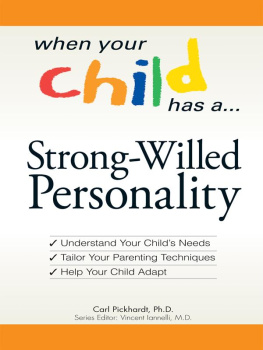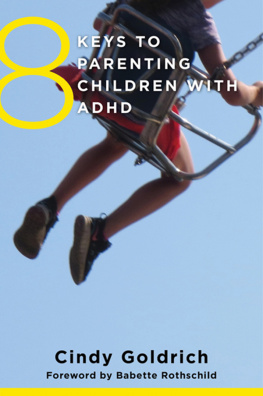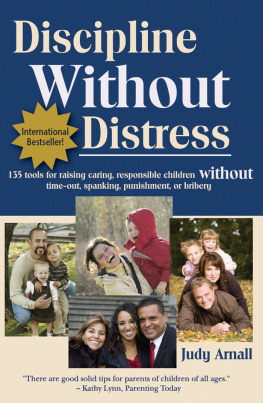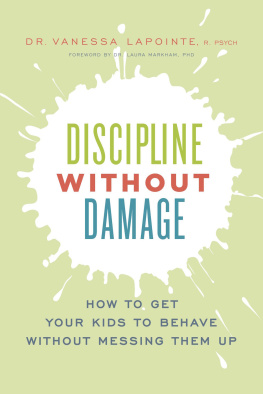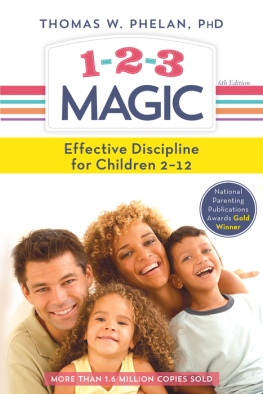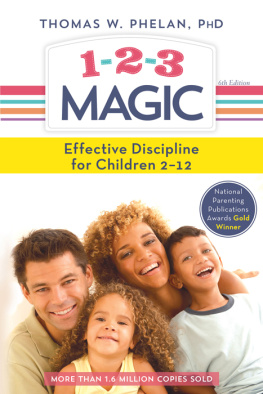Becky A. Bailey, Ph.D.
It is also dedicated to the love between all parents and children.
This love is a gift from the universal power
that unites us all .
Contents
1.
FROM WILLFUL TO WILLING
2.
THE SEVEN POWERS FOR SELF-CONTROL
3.
THE SEVEN BASIC DISCIPLINE SKILLS
4.
ASSERTIVENESS: SAYING NO AND BEING HEARD
5.
CHOICES: BUILDING SELF-ESTEEM AND WILLPOWER
6.
ENCOURAGEMENT: HONORING YOUR CHILDREN SO THEY CAN HONOR YOU
7.
POSITIVE INTENT: TURNING RESISTANCE INTO COOPERATION
8.
EMPATHY: HANDLING THE FUSSING AND THE FITS
9.
CONSEQUENCES: HELPING CHILDREN LEARN FROM THEIR MISTAKES
10.
WHY CHILDREN DO WHAT THEY DO: THE DEVELOPMENT OF MISBEHAVIOR
11.
LOVING GUIDANCE IN ACTION: SOLVING THE TOP DISCIPLINE PROBLEMS
12.
THE LOVING GUIDANCE PROGRAM: CHANGE YOUR LIFE IN SEVEN WEEKS
I have been fortunate to be bathed in love and support for my work. The following people have taught me the power of giving and contributed to the writing of this book. Indeed, they have helped me learn the material it contains.
I am grateful to:
My mother and father, Frances and Talmadge Bailey, for the discipline they showed me and the constant encouragement they offer. To Dr. Mary Thelma Brainard for encouraging me to write and guiding me to discipline myself. To Linda Harris Dragnich, who willingly shared her parenting journey with me. To Mildred Lein-weber Dawson, who took my words and with clarity and style reworked them and fed them back to me. Her editing, writing ability, and wisdom as a parent were gifts to me and I am honored to have worked with her on this book. To Lorrie Cabral, who ran between Milly and myself, ensuring that the changes were made and the book was done. To Kate ONeil, who ran my business, grounded my anxiety, and offered her love and insights. To Casey Doran, who inspired me by making changes in her own life. To Charlene Bell, who wrote the original book proposal that sparked the projects beginning. To Gareth Esersky, my literary agent, who believed in the material. To William Morrow and Toni Sciarra for helping me manifest a dream. To the University of Central Florida for allowing me leave to complete the project. To Sarah Sprinkle, who gave of her precious time to offer suggestions on the original manuscript. To all the children and families who have taught me to deepen my understanding of myself; through that process I have been able to help others. To the creative force of the universe that links us all as one and models love and acceptance. I am honored to relay the message of love and peace.
A wonderful woman who lived in a shoe
Had so many children ,
And she knew exactly what to do .
She held them ,
She rocked them ,
She tucked them in bed ,
I love you, I love you
Is what she said .
H ave you ever thought, I have tried everything possible to get my child to get dressed (or do his homework, or clean his room) and then sadly said to yourself, I give up? Have you ever punished your child and later felt guilty for having behaved in a way that you swore you never would? Have you ever promised yourself to exercise regularly, eat better, or spend more time with loved ones, but found that the promises you made to yourself are difficult to keep? Have you then given up, or felt guilty?
I wrote this book to help you permanently change your own behavior, because only by learning to discipline yourself will you be
If I asked you to teach a class in nuclear physics, could you do it? Probably not. Could you teach your child how to pole-vault? Again, probably not. You cannot teach what you do not know.
Yet we often demand that children acquire skills that we ourselves lack. We ask children to do as we say, not as we do. Parents yell , Go to your room until you are in control of yourself. A mother grabs a toy that two preschoolers are tussling over and says, You know better than to grab toys from your friends. Its mine now! Husbands and wives battle with each other, using attack skills such as name-calling and withdrawal. Then they demand that their children resolve conflicts calmly, by discussing them. Our own emotional intelligence is primitive at best, and whether we admit it or not, we pass our emotional clumsiness on to our children.
For most of us, being consistently in control of ourselves represents a major change. So this book is about change: Its about learning to change your own behavior, and your childrens behavior, so that you can grow closer, embrace and resolve conflict, and enjoy life. Once you model self-control for your children, they will show better self-control than you have ever imagined they could achieve. Delightful surprises await you.
Once you model self-control for your children, they will show better self-control than you have ever imagined they could achieve.
Imagine telling your child one time to take a showerand him actually marching off to do it! Imagine promising yourself to either conquer your clutter, or to relax about itand then keeping your promise. This book will help you realize these possibilities and many, many others.
Easy to Love, Difficult to Discipline can help you become the person you want your child to emulate. It will take your self-discipline and child-rearing skills to new levels. You will learn how to move beyond policing your children with rules and consequences, and discover how to create a home in which healthy relationships flourish and your children voluntarily choose to cooperate.
Sounds impossible? The revised Mother Goose nursery rhyme at the start of this chapter contains all the needed ingredients. If you want your children to change, you must begin by becoming a wonderfully loving adult. You must focus on what you want to have happen instead of what you dont want. You must rely on love, not fear, to motivate yourself and your children. When you learn to love yourself, you will be ready to teach your children to love themselves and one another.
This is a radically different approach from the one summarized in the original rhyme, which goes like this:
There was an old woman who lived in a shoe,
She had so many children
She didnt know what to do.
She gave them some broth
Without any bread;
She whipped them all soundly
And put them to bed.
Have you ever manipulated your child with food like Mother Goose did? (If you behave while I shop, Ill take you to McDonalds.) Have you ever, in desperation, spanked your child? Unsure of how to proceed, have you sent your child to his room, or put him in time out? How often have you felt like the tired old woman (or a tired old dad) after surviving a day with your children, fighting battle after battle? The house really can feel as cramped as a shoe with laces tied too tightly.
How would tomorrow feel if you did know what to do? When your children tormented one another, you would be able to teach them how to resolve their conflicts, rather than resorting to playing bad cop. When your children refused to clean up, you would know how to help them move past resistance and toward cooperation, rather than turning to nagging, punishment, or doing the task yourself. When your children lost control, you would know how to help them calm down and reorganize themselves, rather than out-shouting them. Imagine knowing exactly what to do!



